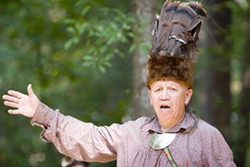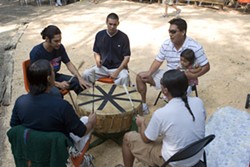Endangered Nation
Will infighting and bankruptcy doom the Catawba Nation and its language?
By Jared NeumarkChief Gilbert Blue was a hero to his tribe after leading the effort in 1993 to secure a $50 million settlement -- the culmination of nearly 20 years of campaigning.
Finally the Rock Hill-based Catawba Nation was recognized federally. The illegal treaty of Nation Ford, signed in 1840 with the State of South Carolina, in which a barrel of whisky with cups hanging from hooks was left in a field for Catawba prior to treaty negotiations, was voided. Gaming privileges were given to the tribe that allowed them to open a bingo hall, ensuring long-term economic stability.
The good feelings didn't last long.
The money generated from the settlement created fighting, and when threats were voiced in the General Council to vote Blue out of office, he shut the entire Nation out of any decision-making for good.
A faction of the tribe, commonly referred to as the Dissident Group, has litigation pending against Blue and his Executive Committee. The Dissidents allege Blue has disenfranchised the tribe, failing to hold General Council meetings twice a year as the Catawba Constitution requires and purposefully delaying elections. Furthermore, the plaintiffs believe Blue is responsible for the impoverished state of their nation, either by making financially imprudent decisions or by criminal wrongdoing.
Part of the suit, which the defense is currently appealing, has called for the Executive Committee to submit financial records to account for the $50 million of settlement money.
General Council meetings including any Catawba members over the age of 18, which the old constitution mandates occur on the first Saturday of January and July, haven't been held since 1998. In a 2002 deposition in federal court, Blue explained why he cancelled meetings. (The suit was eventually thrown out when a judge decided the matter was a state issue. It is now being heard in state court.)
"There were things going on that was being disruptive ... People were hollering, cussing at one another, telling me to shut up, that he wasn't through, and all kinds of things. It was just not conducive to taking care of business." When asked to clarify "disruptive," Blue said, people were calling for elections.
In the deposition, Blue also admitted to extending his powers beyond what was specified in the old constitution. "Even though [the constitution] says January and July, there's nothing that says you can't postpone [meetings], as I said earlier, to another week or even cancel it. There's nothing in there, to my knowledge, that says we can't take care of financial business as far as looking into endeavors for economic development of the Nation."
For the Dissidents, this argument is proof of the chief's dictatorial reign. If the constitution says the General Council will meet twice a year on specific dates, it is self-evident that the chief cannot wantonly cancel those meetings. Contrary to Chief's testimony, the old constitution does stipulate that the General Council, has the right "to regulate the use and disposition of Catawba property and funds' so taking care of the financial business without consulting the General Council is violating the constitution.
James Mosteller, the attorney for the plaintiffs, says he was surprised by the candidness of Blue over denying his tribe liberties guaranteed to them by the Civil Rights act of 1968 and their own constitution. Mosteller says the lawyer of the defense, Jay Bender, "had his head in his hands the whole deposition. I was surprised he didn't tell him to shut up."
"Do I empathize that some people feel like they don't have a voice in the tribe? No," says Mosteller.
Bender points out that one year ago, two positions on the Executive Committee opened up due to death, and everyone in the tribe was eligible to run. Twenty or so candidates applied and everyone was allowed to vote. "I don't think that people who are saying them been disenfranchised are being honest about it." (The Dissident Group says the two officials promised to keep them informed of the Executive Committee's decisions but have turned their backs to the Dissident side after taking office.)
The old constitution provided a way for a disenfranchised group to empower themselves. The Dissident Group gathered a quorum of 86 members and attempted to have the July meeting in 2002. But Blue locked the group out of the Longhouse and later acknowledged that he threatened to fire any tribal employee who tried to attend the gathering. The group held elections anyway, which were subsequently ruled invalid by the Bureau of Indian Affairs.
"Internal Politics is something we don't get ourselves involved with," says Franklin Keel, the Bureau of Indian Affairs Eastern Region Director. "The reason we don't get involved is because we respect their tribal sovereignty. The tribal governments work within the balance of their governing documents."
The defense has argued that the chief, who hasn't stood for election since 1975, is not obligated to do so until a new constitution is passed. Previous attempts to ratify a constitution have been impossible with all the tension and infighting. The Dissident Group says constitutions proposed by the Executive Committee have put too much power in too few hands. Although it has been a 13-year process, Bender is optimistic a new constitution will be worked out and elections can be held in short order. Bender says that lawyers from both sides will have a greater role in forthcoming constitutional negotiations.
The Executive Committee hoped that bingo profits would yield $300 a month to each member on the roll, not to mention creating jobs. 25.3 percent of American Indians live in poverty, which makes them the poorest ethnic group in the United States. They also have one of the highest rates of incarceration, more than twice that of an average American. But an outside company, New River Management, who did not have to consult the General Council, was created to manage the bingo hall. Only a handful of Catawba were ever hired, and very little money ever went back to tribe. (One estimate puts the return to the tribe at as little as three cents per dollar of gross income.)
CL viewed five of the quarterly audit reports that New River Management submitted to South Carolina. The state only required the Catawba to pay a prize return of 50 cents to every dollar, but on four of the reports, New River Management gave out returns ranging from 56.7 to 63.9. This excess in payout money resulted in $215,449, $232,309, $381,432 and $394,659 in unnecessary losses. "All they have to do is write down that they gave it away as prize money, and then they don't have to account for it," says tribal member Fred Sanders.
Since the settlement, two former members of the Executive Committee involved directly with tribal finances have pleaded guilty to stealing from the tribe. Last year former executive director Wanda Warren, who oversaw many financial decisions, pleaded guilty to embezzlement of $24,000. Warren sought double reimbursement on what was already a generous stipend for a conference she and other members of the Executive Committee attended in Switzerland in 2000. In 1998 the accountant for the Tribe, Karen Gregory pleaded guilty and was sentenced to 17 months in jail for transferring over $125,000 worth of Catawba assets into her own name. Several members of the Dissident side believe that Gregory was taking a fall for Treasurer Carson Blue. Their suspicion is not without merit. After being released from prison, Blue hired Gregory to work at his private business Tire Town. Before the bingo operation closed down in 2005, The FBI seized financial records under suspicion that New River Management was contributing campaign finances over the yearly limit. Roy Kime, an FBI agent with the Department of the Interior, confirmed to CL that the tribe is still under investigation but would not elaborate on any specifics of the investigation.
With hardly anything to show for the money received in the 1993 settlement, the Dissident side is hoping the judge will uphold a motion that will require Blue to turn over financial records. The dissidents claim that Chief Blue told them in a July 26, 2005 conversation in which they tape-recorded, that he spent the $12.5 million of settlement money allocated for land acquisition to pay salaries of tribal employees (including his own) and on lawyer fees. If true, this would be an illegal expenditure of the settlement money. In August, the tribe sold the bingo hall and Rock Hill Mall for $4 million after paying $5.9 million for the property 10 years ago. Many Catawba believe the money from the sale of the mall will be used to pay more salaries. Chief Blue did not return calls made to his office.
According to Franklin Keel, who presides over 27 tribes from Maine to Louisiana, the tribe lost its Indian Health Services (IHS) and BIA funding, a large part of which went to finance cultural preservation projects like language recovery, "for failing to submit audits required by federal law." Keel says a tribe losing BIA funding "doesn't happen a lot."
"It was both a challenge and an opportunity to make the government work. Many good things got accomplished," says Bender on the financial situation. "Other things that were attempted were not successful for a variety of reasons. Lack of business experience, lack of governmental accounting experience would be two that would come to mind."
Bender points to the BIA's decision to pull funding and South Carolina's "leveling of the gaming playing field" when they began a state lottery in 2005 as major reasons for the drying up of resources. Bender is representing the tribe in two other lawsuits against municipal government, one claiming Rock Hill double charged the tribe for water utilities, and the other suit alleging the state reneged on promised video poker rights. Just a couple of weeks ago, a site was found in Fort Mill that contained historical Catawba relics and burial grounds. Bender says the Catawba were not even consulted about the land. "I always joke that my job as a lawyer for the tribe is to keep the boot heal of the state off the neck of the tribe," Bender says. "And that unfortunately is as true today as it was in 1840 when the state stole the tribe's 144,000-acre reservation."
Jarom Canty, part of the younger generation of Catawba now getting involved with the politics of the tribe, believes the current attitude of the state and discrimination he and fellow members of the Catawba Nation encounter in Rock Hill is a result of the Blue administration's many gaffes. "It would be different if our tribe appeared to be getting along and doing well. And if we were able to provide back to the community, back to Rock Hill, back to the state of South Carolina. But [the executive committee] doesn't do anything like that. They've squandered all our money away. Sold all our land, lost grants. So we're looked down on."
See also:
Speaking of 4.00000
-
Letters to the Editor
Dec 19, 2007 -
Checking it Twice
Dec 19, 2007 -
Racial Whiplash
Dec 19, 2007 - More »
Latest in Cover
More by Jared Neumark
-

Best of The Blotter 2007
Nov 28, 2007 -

Preaching and drinking
Mar 7, 2007 -

Preaching and Drinking
Dec 27, 2006 - More »
Calendar
-

Wine & Paint @ Blackfinn Ameripub- Ballantyne
-

Queen Charlotte Fair @ Route 29 Pavilion
-

NEW WINDOW GALLERY-Pat Rhea-ACRYLIC PAINTINGS-April 05-30 2024 VALDESE, NC 28690 @ New Window Gallery/Play It Again Records
- Through April 30, 12 p.m.
-

TheDiscountCodes
-

Face to Face Foundation Gala @ The Revelry North End
-
Esports in Charlotte Takes Off: A Guide to Virtual Competitions and Betting
-
Canuck in the Queen City 7
A Canadian transplant looks back at her first year as a Charlotte resident
-
Homer's night on the town 41
If you drank a shot with the Knights mascot on Sept. 20, you were basically harboring a fugitive











